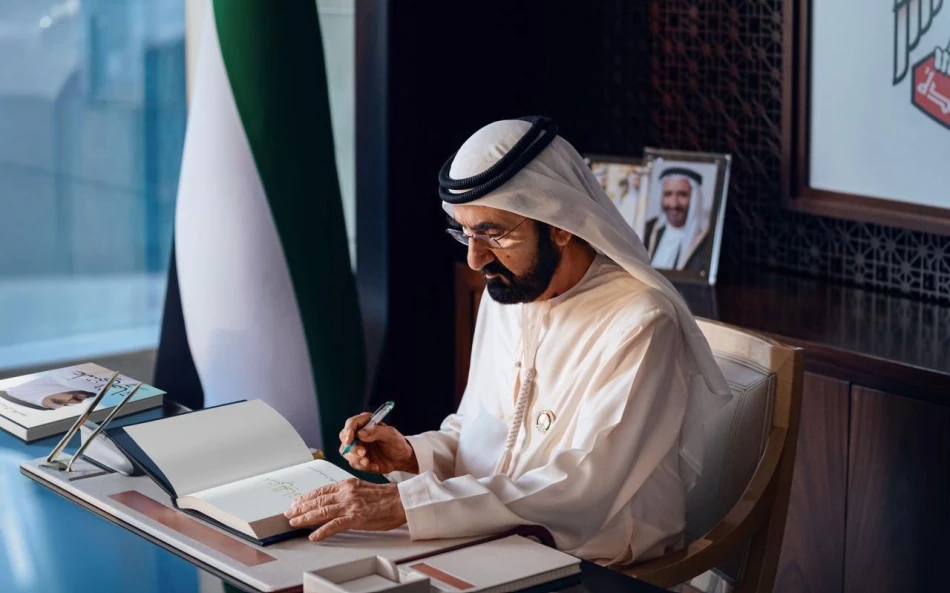
Sheikh Mohammed Shares Life Lessons in New Book 'What Life Taught Me'
Dubai's Ruler Launches Memoir as Leadership Blueprint for Future Generations
Sheikh Mohammed bin Rashid Al Maktoum, Vice President and Prime Minister of the UAE and Ruler of Dubai, has released the first volume of his memoir "What Life Has Taught Me," distilling six decades of governance experience into a leadership manual. The book represents a rare glimpse into the strategic thinking behind Dubai's transformation from a modest trading port into a global business hub, offering insights that extend far beyond regional politics into universal principles of leadership and human management.
A Statesman's Reflection on Power and Progress
In announcing the book on social media platform X, Sheikh Mohammed framed his work as more than a traditional memoir. "Sixty years of public service... in politics, governance, and life... the essence of what experiences have taught me," he wrote, positioning the text as a knowledge repository for current and future generations.
The timing of this release is particularly significant. As the UAE approaches its sixth decade of independence and Dubai continues to position itself as a bridge between East and West, the memoir arrives at a moment when the emirate's governance model faces both admiration and scrutiny on the global stage.
Beyond Projects: Focus on Enduring Principles
What distinguishes this memoir from typical political autobiographies is Sheikh Mohammed's explicit focus on principles over projects. Rather than cataloging Dubai's impressive infrastructure achievements—from the Burj Khalifa to Dubai International Financial Centre—the ruler emphasizes that "ideas are more enduring, concepts are more comprehensive, and principles are greater."
This philosophical approach reflects a broader trend among Gulf leaders seeking to institutionalize their governance models beyond individual achievements. Similar to Singapore's Lee Kuan Yew, whose memoirs became required reading for policymakers worldwide, Sheikh Mohammed appears to be codifying the "Dubai Model" for replication and study.
The Human Element in Governance
The book's emphasis on human psychology in leadership—"dealing with people of different natures, multiple psychologies, and rapid changes"—addresses a critical gap in leadership literature from the region. While much has been written about Dubai's economic strategies, less attention has been paid to the human management aspects that enabled such rapid social and economic transformation.
This focus on human dynamics becomes increasingly relevant as Dubai continues to attract a diverse international population, with expatriates comprising over 85% of the emirate's residents. Managing such demographic complexity requires sophisticated understanding of cross-cultural leadership—experience that could prove valuable for other rapidly globalizing cities.
Implications for Regional Leadership Models
The memoir's release coincides with broader discussions about governance models in the Gulf region. As traditional oil economies diversify and younger generations assume leadership roles, there's growing interest in documenting and systematizing successful approaches to rapid modernization while maintaining social stability.
Sheikh Mohammed's decision to present his insights as universal principles rather than region-specific strategies suggests an ambition to influence leadership thinking beyond the Middle East. This mirrors efforts by other successful city-states and regions to export their governance expertise through consulting and advisory services.
A Legacy Project with Contemporary Relevance
By structuring the book as a direct address to his children, his people, and "anyone who wants to learn even a word, phrase, or line from my life," Sheikh Mohammed positions this work as both personal legacy and public service. This approach transforms what could have been a self-congratulatory memoir into a practical handbook for aspiring leaders.
The book's simple language and direct style, as emphasized by the author, appears designed for maximum accessibility—a strategic choice that could extend its influence far beyond traditional diplomatic and academic circles into the broader business and entrepreneurial communities that drive Dubai's economy.
Most Viewed News

 Sara Khaled
Sara Khaled






